2012年中考新目标(Go for it)版英语基础知识复习第三讲 七年级(下) Units 1~6
文档属性
| 名称 | 2012年中考新目标(Go for it)版英语基础知识复习第三讲 七年级(下) Units 1~6 | 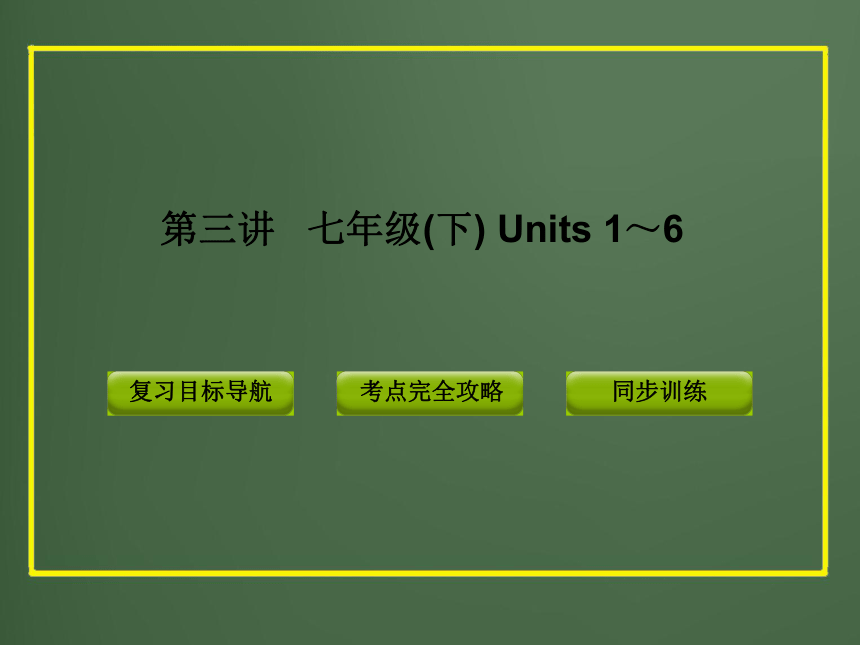 | |
| 格式 | ppt | ||
| 文件大小 | 1.3MB | ||
| 资源类型 | 试卷 | ||
| 版本资源 | 人教新目标(Go for it)版 | ||
| 科目 | 英语 | ||
| 更新时间 | 2012-02-15 23:36:29 | ||
图片预览

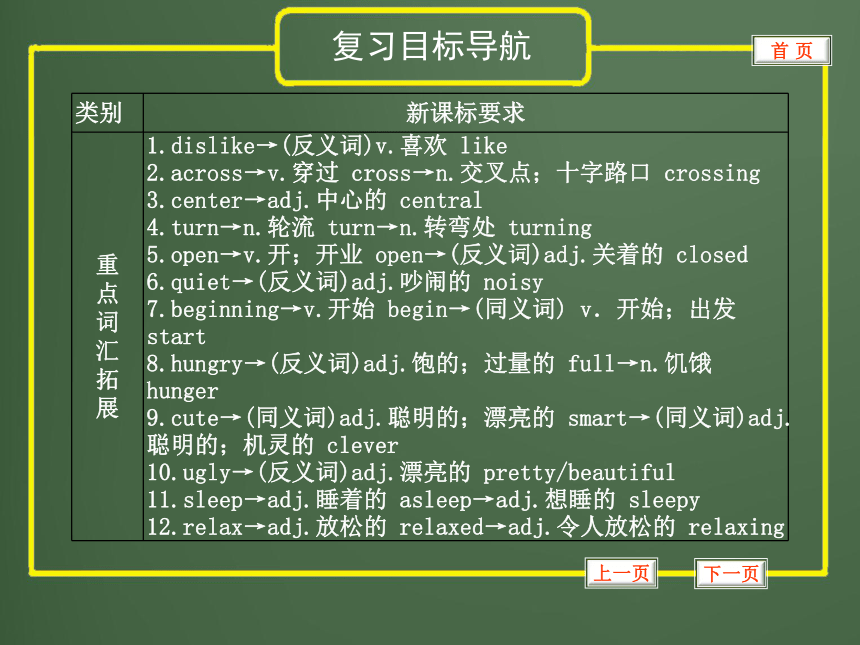
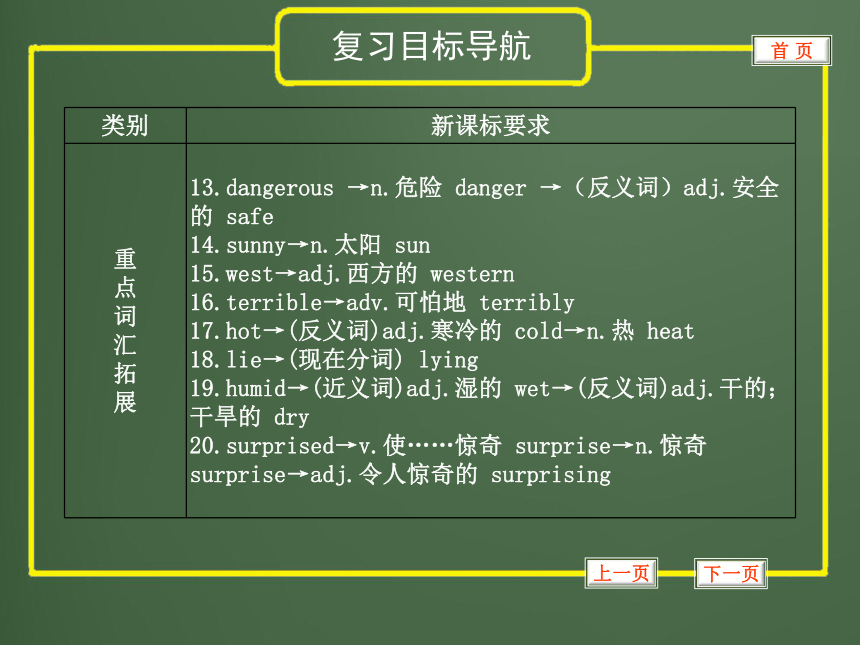
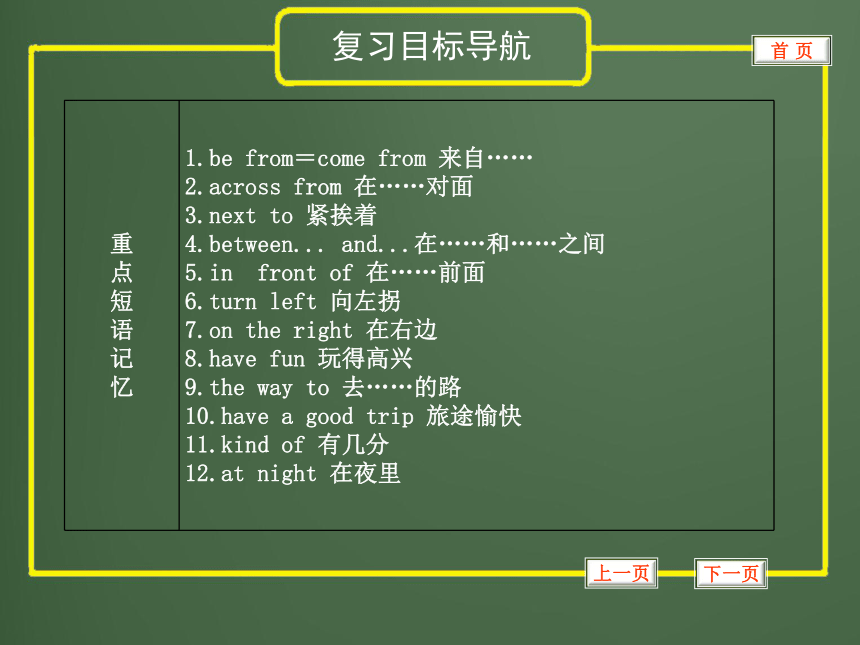
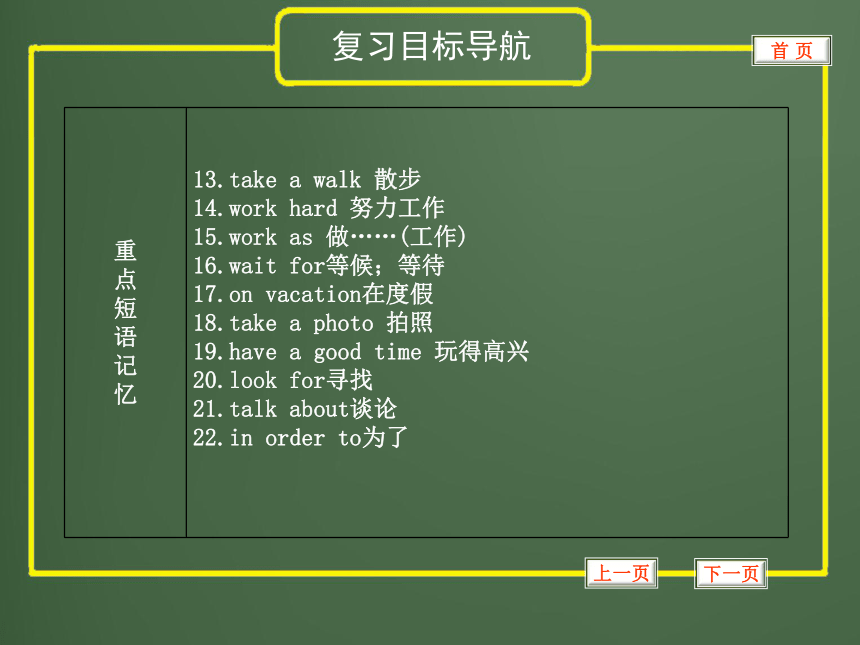
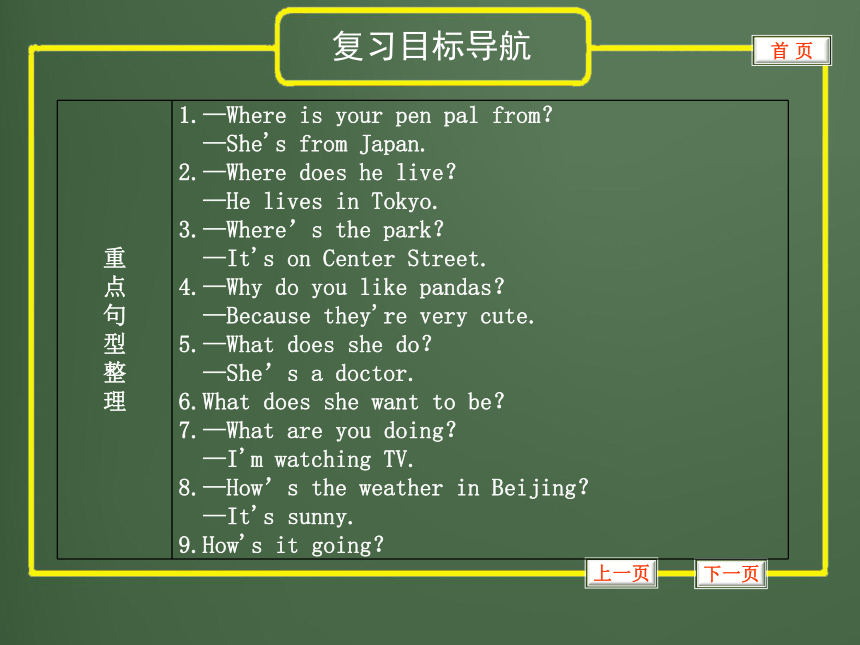
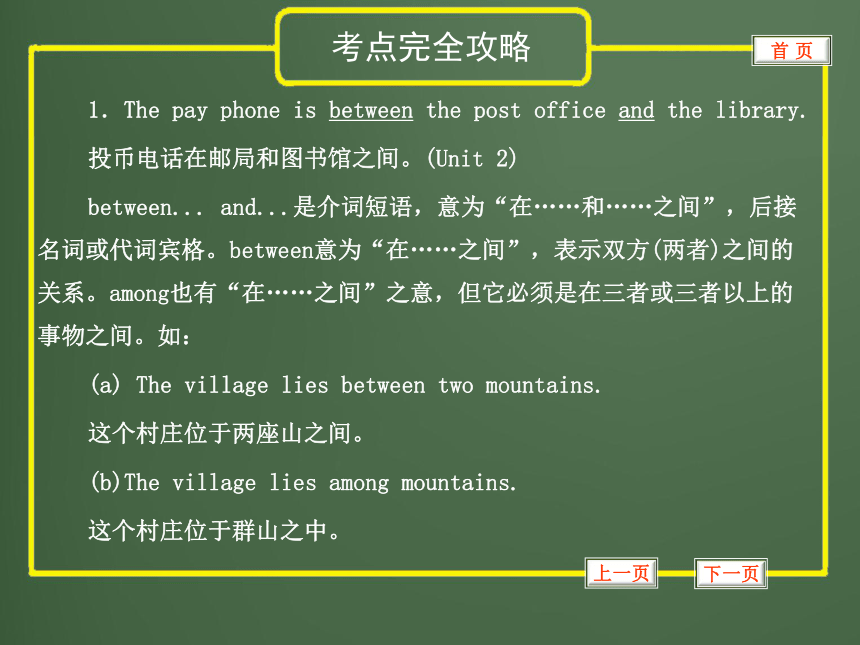
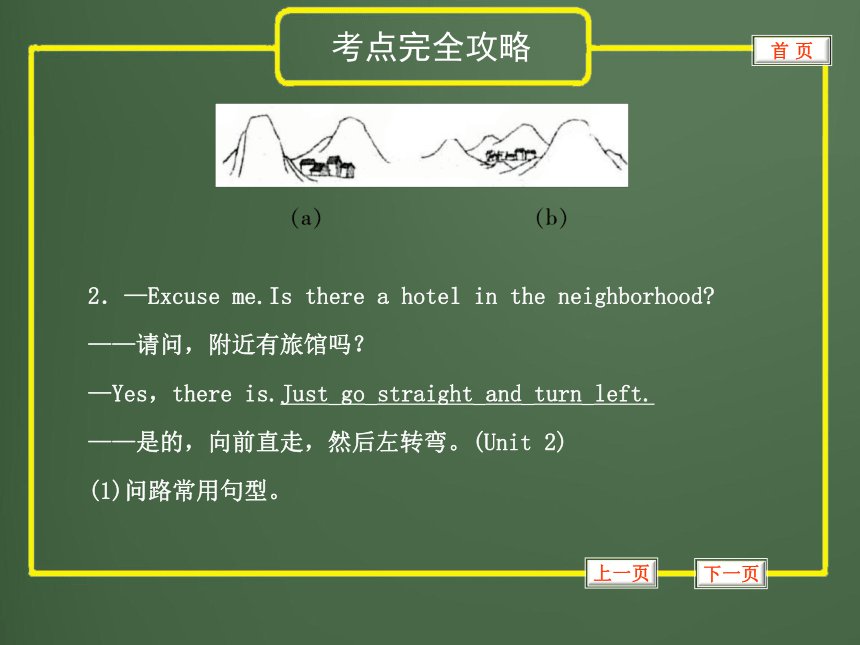
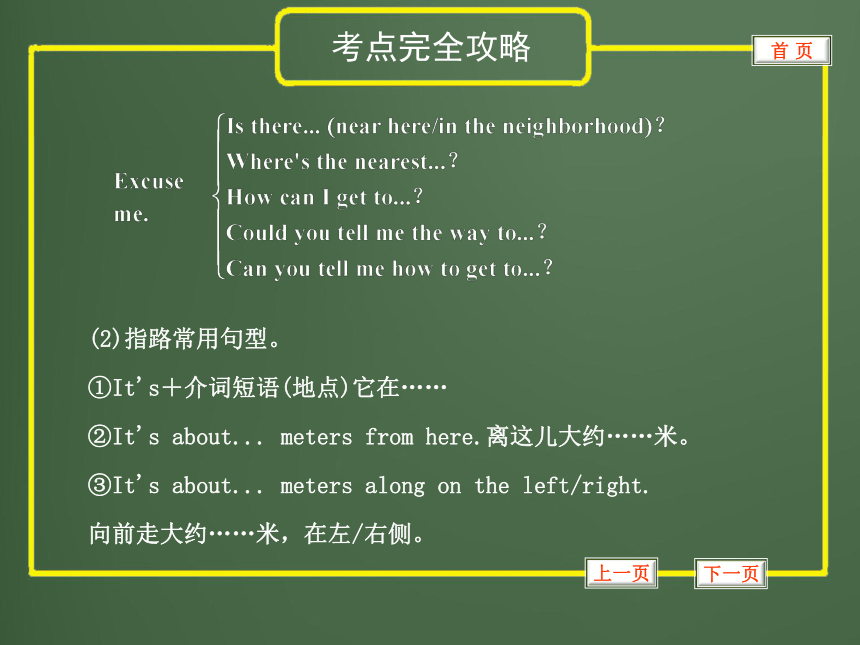
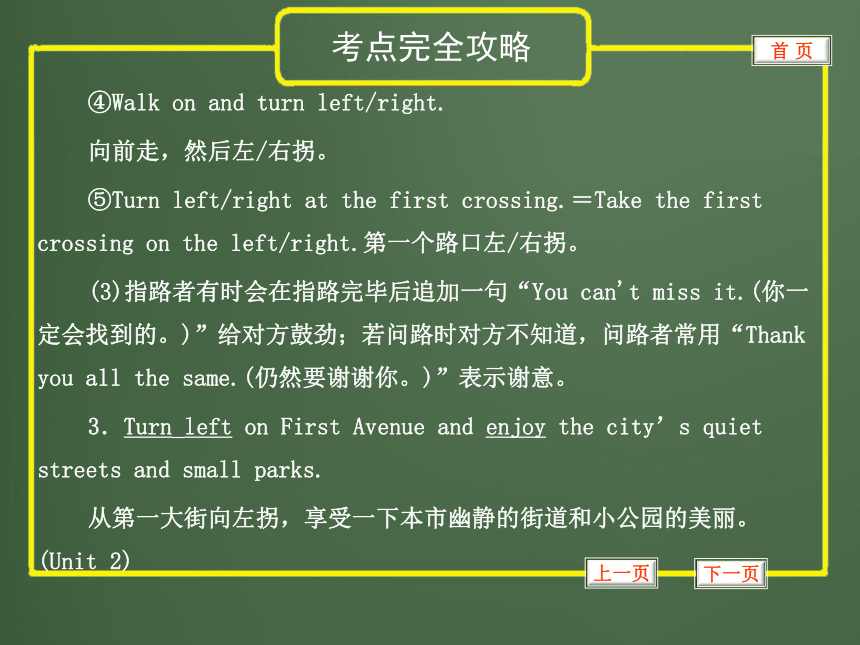
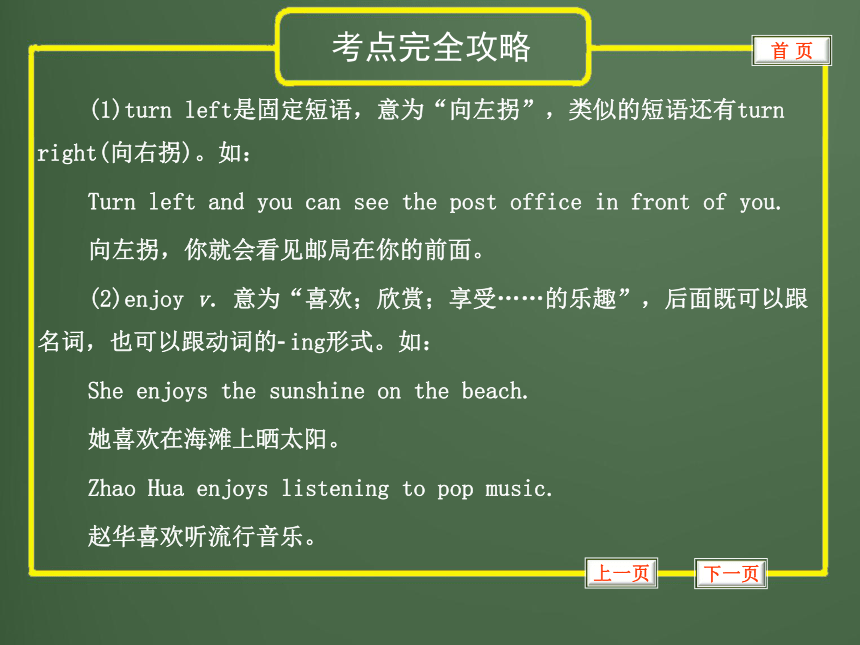
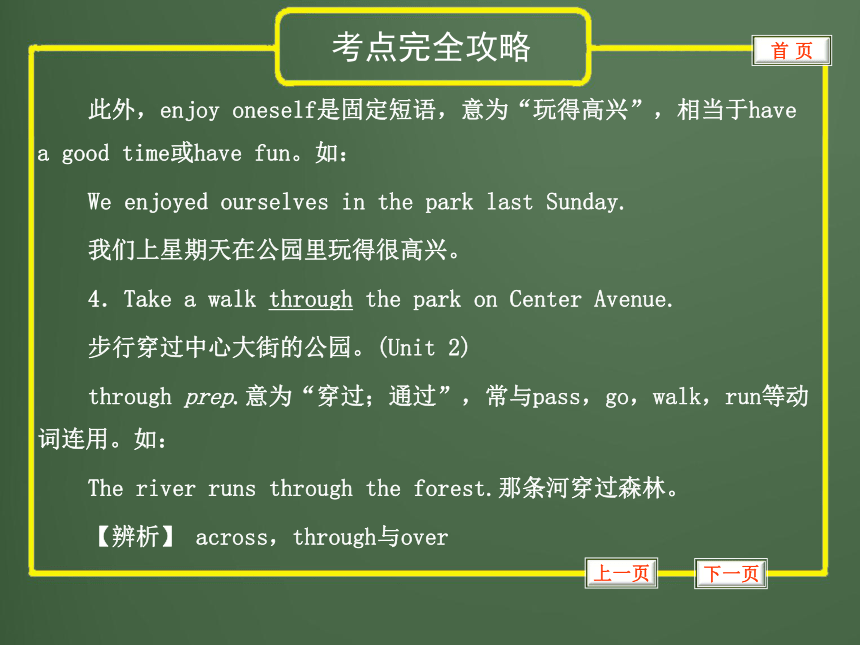
文档简介
(共56张PPT)
第三讲 七年级(下) Units 1~6
复习目标导航
考点完全攻略
同步训练
类别 新课标要求
重
点
词
汇
拓
展 1.dislike→(反义词)v.喜欢 like
2.across→v.穿过 cross→n.交叉点;十字路口 crossing
3.center→adj.中心的 central
4.turn→n.轮流 turn→n.转弯处 turning
5.open→v.开;开业 open→(反义词)adj.关着的 closed
6.quiet→(反义词)adj.吵闹的 noisy
7.beginning→v.开始 begin→(同义词) v.开始;出发 start
8.hungry→(反义词)adj.饱的;过量的 full→n.饥饿 hunger
9.cute→(同义词)adj.聪明的;漂亮的 smart→(同义词)adj.聪明的;机灵的 clever
10.ugly→(反义词)adj.漂亮的 pretty/beautiful
11.sleep→adj.睡着的 asleep→adj.想睡的 sleepy
12.relax→adj.放松的 relaxed→adj.令人放松的 relaxing
类别 新课标要求
重
点
词
汇
拓
展 13.dangerous →n.危险 danger →(反义词)adj.安全 的 safe
14.sunny→n.太阳 sun
15.west→adj.西方的 western
16.terrible→adv.可怕地 terribly
17.hot→(反义词)adj.寒冷的 cold→n.热 heat
18.lie→(现在分词) lying
19.humid→(近义词)adj.湿的 wet→(反义词)adj.干的;干旱的 dry
20.surprised→v.使……惊奇 surprise→n.惊奇 surprise→adj.令人惊奇的 surprising
重
点
短
语
记
忆 1.be from=come from 来自……
2.across from 在……对面
3.next to 紧挨着
4.between... and...在……和……之间
5.in front of 在……前面
6.turn left 向左拐
7.on the right 在右边
8.have fun 玩得高兴
9.the way to 去……的路
10.have a good trip 旅途愉快
11.kind of 有几分
12.at night 在夜里
重
点
短
语
记
忆 13.take a walk 散步
14.work hard 努力工作
15.work as 做……(工作)
16.wait for等候;等待
17.on vacation在度假
18.take a photo 拍照
19.have a good time 玩得高兴
20.look for寻找
21.talk about谈论
22.in order to为了
重
点
句
型
整
理 1.—Where is your pen pal from?
—She's from Japan.
2.—Where does he live?
—He lives in Tokyo.
3.—Where’s the park?
—It's on Center Street.
4.—Why do you like pandas?
—Because they're very cute.
5.—What does she do?
—She’s a doctor.
6.What does she want to be?
7.—What are you doing?
—I'm watching TV.
8.—How’s the weather in Beijing?
—It's sunny.
9.How's it going?
1.The pay phone is between the post office and the library.
投币电话在邮局和图书馆之间。(Unit 2)
between... and...是介词短语,意为“在……和……之间”,后接名词或代词宾格。between意为“在……之间”,表示双方(两者)之间的关系。among也有“在……之间”之意,但它必须是在三者或三者以上的事物之间。如:
(a) The village lies between two mountains.
这个村庄位于两座山之间。
(b)The village lies among mountains.
这个村庄位于群山之中。
2.—Excuse me.Is there a hotel in the neighborhood
——请问,附近有旅馆吗?
—Yes,there is.Just_go_straight_and_turn_left.
——是的,向前直走,然后左转弯。(Unit 2)
(1)问路常用句型。
(2)指路常用句型。
①It's+介词短语(地点)它在……
②It's about... meters from here.离这儿大约……米。
③It's about... meters along on the left/right.
向前走大约……米,在左/右侧。
④Walk on and turn left/right.
向前走,然后左/右拐。
⑤Turn left/right at the first crossing.=Take the first crossing on the left/right.第一个路口左/右拐。
(3)指路者有时会在指路完毕后追加一句“You can't miss it.(你一定会找到的。)”给对方鼓劲;若问路时对方不知道,问路者常用“Thank you all the same.(仍然要谢谢你。)”表示谢意。
3.Turn_left on First Avenue and enjoy the city’s quiet streets and small parks.
从第一大街向左拐,享受一下本市幽静的街道和小公园的美丽。(Unit 2)
(1)turn left是固定短语,意为“向左拐”,类似的短语还有turn right(向右拐)。如:
Turn left and you can see the post office in front of you.
向左拐,你就会看见邮局在你的前面。
(2)enjoy v.意为“喜欢;欣赏;享受……的乐趣”,后面既可以跟名词,也可以跟动词的 ing形式。如:
She enjoys the sunshine on the beach.
她喜欢在海滩上晒太阳。
Zhao Hua enjoys listening to pop music.
赵华喜欢听流行音乐。
此外,enjoy oneself是固定短语,意为“玩得高兴”,相当于have a good time或have fun。如:
We enjoyed ourselves in the park last Sunday.
我们上星期天在公园里玩得很高兴。
4.Take a walk through the park on Center Avenue.
步行穿过中心大街的公园。(Unit 2)
through prep.意为“穿过;通过”,常与pass,go,walk,run等动词连用。如:
The river runs through the forest.那条河穿过森林。
【辨析】 across,through与over
across 横越穿过,指从表面走过或从一边到另一边。
Through 穿越,指从空间内穿过。
over 翻越,指越过一段距离或度过一段时间。
5.Because they're kind_of interesting.
因为它们有几分趣味。(Unit 3)
kind of和a little意思相近,意为“有点儿;稍微”,多用于口语,用来修饰形容词。如:
She is kind of shy.她有点害羞。
【拓展】 ①kind可作形容词,意为“和蔼的;善良的”。如:
Mrs.Brown is an old kind lady.
布朗夫人是位善良的老太太。
②kind可作名词,意为“种类;类型”,常用的短语有:
a kind of一种;一类。如:
a kind of moon cake 一种月饼
different kinds of不同种类的。如:
There are many different kinds of animals on this island.
这个岛上有许多不同种类的动物。
all kinds of各种各样的。如:
There are all kinds of vegetables in the store.
这家商店有各种各样的蔬菜。
6.I wear a white uniform and I help doctors.
我穿着白色制服,协助医生工作。(Unit 4)
wear意为“穿着;戴着”,强调穿的状态。如:
Jenny is wearing a red skirt.珍妮穿着一件红裙子。
【辨析】 wear,put on,dress与in
单词 词性
及用法 含义 宾语 其他
wear vt.
表状态 穿着,
戴;
蓄(须),
留发 衣服、鞋帽、
眼镜、头发、
胡须等 put on的反义短语是take off
②be dressed in=be in穿着;get dressed穿戴好;dress up (as) 装扮(成)
③be in=be wearing
put on vt.
表动作 穿上 衣服
dress vt.
表动作 给某人
穿衣服 sb.,oneself
in prep.
表状态 穿着 衣服、颜色
7.Sometimes I work in the day and sometimes at night.
有时我白天工作,有时晚上工作。(Unit 4)
【辨析】 sometimes,some times,sometime与some time
①sometimes adv.意为“有时”,经常和一般现在时连用。
如:
Sometimes she goes for a walk after supper.
有时她晚饭后出去散步。
②some times是名词短语,意为“几次;数次”,可以和现在完成时连用。如:
I have been to Qingdao some times.
我去过青岛好几次了。
③sometime adv.意为“某时;某个时候”,既可以表过去,也可以表将来。如:
—When will you start ——你何时动身?
—Sometime next month.——下个月的某个时候。
④some time是名词短语,意为“一段时间”。如:
I’ll be away for some time.我要离开一段时间。
8.—How's_the_weather in Beijing
——北京的天气怎么样?
—It's sunny.——晴天。(Unit 6)
①询问天气的常用句型有:What's the weather like+地点状语?或How's the weather+地点状语?如:
How's the weather in London
=What's the weather like in London
伦敦的天气怎么样?
②回答时常用形容词:sunny,rainy,windy,cloudy,snowy,foggy等。
9.Some are taking photos.Others are lying on the beach.一些人在拍照,其他人躺在海滩上。(Unit 6)
take photos意为“拍照”;lying是lie(躺)的现在分词。
【辨析】 other,the other,others,the others与another
①other可作形容词或代词,作形容词时意为“别的;其他的”,泛指“其他的(人或物)”。如:
Do you have any other questions?你还有其他问题吗?
②the other 意为“另一个”,常用于两个人或物中的另一个。
句式为one... the other...,意为“一个……另一个……”。如:
He has two daughters.One is a nurse,the other is a worker.他有两个女儿,一个是护士,另一个是工人。
③others是other的复数形式,泛指“另外几个;其余的”,在句中可作主语、宾语。常用于句式some... others...,意为“一些……另一些……”。如:
Some of us like singing and dancing;others like playing sports.我们中一些人喜欢唱歌和跳舞,其他的人喜欢从事体育活动。
④the others意为“其他东西;其余的人”,特指某一范围内的“其他的(人或物)”,是the other的复数形式。如:
Two boys will go to the zoo,and the others will stay at home.两个男孩将去动物园,其余的留在家里。
注:the others=the other+复数名词
⑤another既可作形容词,也可作代词,只能用于出现三个或者更多的人或物时,泛指同类事物中三者或三者以上的“另一个”,只能代替或修饰单数可数名词。如:
I don't like this one.Please show me another.
我不喜欢这一个,请让我看看另一个。
10.—How's it going?——情况如何?
—Great!——好极了!(Unit 6)
亲朋好友长期不见面,有时在电话里会询问对方近来一段时间的情况。询问时可使用“How's it going(情况怎么样)?”回答时按情况的好坏依次是Pretty good.(相当好。),Great.(好极了。),Not bad.(不错。),Terrible.(糟透了。)。
11.But everyone is having_a_good_time.
但是大家玩得很开心。(Unit 6)
(1)everyone为代词,意为“人人;每个人”,同义词为everybody,只能指人,后面不能接of,谓语动词用单数。如:
Is everyone here?大家都来了吗?
【拓展】 ①every one相当于each,表示“每一个”,可指人也可指物,后可接of短语,谓语动词用单数。
②everyone的反义词是nobody,表示全部否定;not everyone/everybody表示部分否定。如:
Every one of them has a new bike.
他们每个人都有一辆新自行车。
Not everyone likes ice cream in summer.
夏天并非所有人都喜欢吃冰淇淋。(部分否定)
Nobody likes ice cream in summer.
夏天没有人喜欢吃冰淇淋。(全部否定)
(2)have a good time“玩得开心;过得愉快”,相当于have fun或enjoy oneself。如:
Children have fun at school.
=Children have a good time at school.
=Children enjoy themselves at school.
孩子们在学校里玩得很开心。
七年级下(1~6单元)
(训练时间:60分钟 分值:100分)
基础知识过关
一、根据所给的汉语提示和句意写出单词(14分)
1.There are two ___________(饭馆) near here, which one do you want to go to
2.How many ___________(国家) are there in the world
3.There is a tall tree ________(在……后面) our school. It is about 50 years old.
restaurants
countries
behind
4.—Where does your foreign teacher come from
—Oh, she comes from ___________(澳大利亚).
5.I am ________(饥饿). Can you give me something to eat
6.It is __________(危险的). Don't skate on the thin ice.
7.They discussed the _________ (天气) and other topics.
二、根据汉语提示完成句子(16分)
1.我奶奶喜欢饭后散步。
My grandmother likes __________ ____ after dinner.
2.投币电话亭在图书馆对面。
The pay phone is __________ the library.
Australia
hungry
dangerous
weather
taking a walk
across from
3.小明的家紧挨着颐和园。
Xiao Ming's home is _________ the Summer Palace.
4.向左转,你就会看见那家邮局。
__________,you will see the post office.
5.住在旅馆的大多数人不是生意人就是度假旅游者。
Most people who stay in hotel are either business people or tourists __________ ___.
6.经理一会儿就有空了,你可以在这儿等候她。
The manager will be free soon. You can _________ her here.
next to
Turn left
on vacation
wait for
7.他看上去有点儿生气了。
He looked _________ angry.
8.我喜欢和我的朋友们一起去看电影,并且喜欢做运动。
____________________________________________________________
三、句型转换(10分)
1.His friend lives __________.(就画线部分提问)
__________ his friend _____
2.She does her homework every evening.(改为否定句)
She __________ her homework every evening.
kind of
I like going to the movies with my friends and playing sports.
in Beijing
Where does
live
doesn't do
3.How's the weather today?(改为同义句)
______ the weather _____ today
4.Where is Mr.Smith from?(改为同义句)
Where _____ Mr.Smith ______ from
5.He is reading_a_book.(就画线部分提问)
______ __ he doing
综合能力提高
一、单项选择(10分)
What's
like
does
come
What is
1.—Excuse me ________
—It is over there, near the bus stop.
A.How do you like the cinema
B.May I ask you the way
C.Where is the Bank of China
D.How far is the market from here
【解析】考查交际用语。由答语“它在那边,靠近汽车站。”可知选C,句意为“中国银行在哪里?”
【答案】C
2.(2011·临沂)—Excuse me.Could you please tell me where I can get the dictionary
—________.There's a bookstore on Yimeng Road.
A.Sorry B.Sure
C.Good idea D.Thank you
【解析】考查口语交际。通过答语的下半句可知答语为肯定回答,用sure来回答Could you please...引导的表示委婉语气的一般疑问句。
【答案】B
3.(2011·湘西)—________?
—He is tall.
A.How is he
B.What does he look like
C.What does he like
【解析】考查特殊句式。How is he?“他健康吗?”What does he like?“他喜欢什么?”而What does he look like?才是问:“他长什么样子?”。
【答案】B
4.—Jack Jack Can you come
—I ________ my homework.
A.do B.will do
C.am doing D.was doing
【解析】考查现在进行时。答语表示正在进行的动作,用现在进行时。句意为“Jack?Jack?你能过来吗”“我正在做作业。”故选C。
【答案】C
5.(2011·安顺)—________kind girl Nancy is!
—Yes,she is always ready to help others.
A.What B.What a
C.How D.How a
【解析】考查感叹句的用法。What+a/an+形容词+名词+主语+谓语!而how引导的感叹句结构是:How+形容词/副词+主语+谓语!根据句意应该选择B。
【答案】B
6.—Do we have to finish our homework this afternoon
—Yes, you ________.
A.must B.can
C.may D.need
【解析】考查情态动词的用法。“我们今天下午必须完成家庭作业吗?”答语“是的。”根据句意选A,表示“必须”。
【答案】A
7.She is new here, so we know ________ about her.
A.nothing B.something
C.anything D.everything
【解析】考查不定代词。由句意“她是新来的,所以我们对她一无所知。”可知选A。
【答案】A
8.—Excuse me, which is the way to the post office
—Sorry, I don't know.You can ask the policeman over there.
—________
A.How lucky!
B.It's a pity.
C.Thank you all the same.
【解析】考查交际用语。根据句意“打扰了。邮局怎么走?”“对不起,我不知道。你可以问那边的警察。”可知选C,表示“仍然感谢。”
【答案】C
9.(2011·安顺)—I can't stop smoking,doctor.
—For your health,I'm afraid you ________.
A.may B.can
C.have to D.need
【解析】考查交际用语。根据句意“医生,我不能戒烟。”“为了你的健康,恐怕你不得不。”may意为“可以”;can意为“能够”;need意为“需要”均不符合句意。
【答案】C
10.(2011·佛山)Parents care about ________ children's education more than anything else.
A.their
B.them
C.theirs
【解析】考查代词的用法。名词前面用形容词性物主代词。故选A。
【答案】A
二、完形填空(10分)
用括号中所给词的适当形式填空,使短文意思完整。
Dear student,
My name is Bob.I live in Toronto,__1__(Canadian),and I
want a pen pal in China.I think __2__(Chinese)is a very
__3__(interest)country.I am 14 __4__(year)old.And
__5__(I)birthday is in November.I can speak English and a
__6__(few)French.I have a brother,Paul and a sister,
Sarah.They have __7__(pen pal)in the United Kingdom and
Australia.
I like going to movies with my friends and __8__(play)
sports.__9__(I) favorite subject in school is P.E.It's fun.But I don't like math.It's too difficult.
Can you write to__10__(I) soon
【答案】
1.Canada 【解析】Canada“加拿大”,此处意为“我住在加拿大的多伦多市……”。
2.China 【解析】由后边的“country”可知此处是指国家,故填China“中国”。
3.interesting 【解析】修饰“country”要用“interesting”,意为“有趣的”。
4.years 【解析】“be+基数词+year(s)+old”为表达年龄的固定用法;当基数词大于1时,year要用复数。
5.my 【解析】修饰名词“birthday”要用形容词性物主代词“my”。
6.little 【解析】“French”为不可数名词,用little修饰。
7.pen pals 【解析】由“...in the United Kingdom and Australia.”可知此处要用复数。
8.playing 【解析】like doing sth.“喜欢做某事”,故填“playing”与前面的“going”并列。
9.My 【解析】修饰名词“subject”要用形容词性物主代词。
10.me 【解析】代词作宾语要用宾格形式,故填“me”。
三、阅读理解(10分)
Prana was a beautiful dog, whose name means “breath of life”. Although he died several years ago, I can still remember the days we spent together and what he has taught me about love.
I have two apple trees in the garden. Prana loved apples. When he went outside, he'd catch an apple and take it into the house to eat later. The apples had been on the ground and were often dirty,so I wasn't always happy that Prana had brought them into the house.
It was an autumn day in America, but it was very cold. A big snow fell and we had not done anything for its coming. On that special day, Prana went outside and I watched him through the window. I noticed that he was madly digging(挖) holes and bringing the apples to the ground so they could be seen above the snow. I did not know why he was doing this. He seemed to want to do something special.
When I called him back, he had his usual one apple in his mouth. About five minutes later, I looked outside. The garden was completely covered with birds. Prana had dug up all
those apples for his bird friends to eat. He knew that they wouldn't have stored enough food for the coming winter!
1.Prana was ________.
A.the writer B.a boy C.a bird D.a dog
【解析】由第一段第一句“Prana was a beautiful dog...”得知。
【答案】D
2.I wasn't always happy because ________.
A.Prana loved apples
B.Prana caught an apple and ate it
C.the apples fell on the ground and were dirty
D.Prana brought the dirty apples into the house
【解析】由第二段最后一句得知。
【答案】D
3.On the snowy day, Prana ________.
A.ate up all the apples
B.dug holes to put the apples in them
C.brought the apples under the snow to the ground
D.left the house and died
【解析】由第三段中倒数第三句“我注意到它在疯狂地挖洞,并把苹果挖出来放在地上……”可知。
【答案】C
4.The birds flew to the garden to ________.
A.look for Prana B.eat the apples
C.make new homes D.store food for the winter
【解析】由最后一段倒数第二、三两句可知。
【答案】B
5.The topic of the story is about ________.
A.apples B.animals C.love D.life
【解析】由最后一段得知,本文的主题是爱的奉献。
【答案】C
四、任务型阅读(10分)
The giant panda is one of the most popular animals in the world. A giant panda can grow up to 1.5 meters long and weigh up to 160kg. People think the giant panda is very lovely. ①So it_is_not_surprising_that_the_World_Wide_Fund_for_Nature_chose the_giant_panda_as_its_symbol. The WWF tells people about animals that they are in danger and raises money to save them.
The giant panda only lives in the wild in China. In the early 1980s,there were only 1,000 left in the wild. The main reason why pandas are endangered is that the area where pandas can live has become smaller.
The WWF works to help giant pandas in the wild in many ways. One of the ways that helps them is to increase the size of panda reserves(自然保护区). Some reserves need to be joined together by planting bamboo between them to make “corridors”. These are paths that lead from one reserve to another. No one may harm the pandas in these areas. The corridors let pandas move from one habitat(栖息地) to another to look for food. ②People_are_working_very_hard_to_make_sure_the_giant_panda_does not_die_out.
1.How long and heavy can a giant panda grow to be
________________________________________
【解析】由第一段第二句可知。
【答案】1.5 meters long and weigh up to 160kg.
2.将文中画线的句子①改为被动句。
So it is not surprising that ________________ by the World Wide Fund for Nature.
【解析】改为被动句时注意,从句的时态为一般过去时。
【答案】the giant panda was chosen as its symbol
3.Why are the giant pandas endangered
____________________________________________________
【解析】由第二段第三句可知。
【答案】Because the area where pandas can live has become smaller.
4.Give a way to help the giant pandas in the wild, please.
______________________________________________________
【解析】由第三段第二句可知。
【答案】To increase the size of panda reserves.
5.将文中画线的句子②翻译成中文。
______________________________________________________
【解析】make sure“确保”;die out“灭绝”。
【答案】人们为了确保大熊猫不灭绝而不懈努力着。
五、书面表达(20分)
你对未来有什么打算,请以“I want to be a/an...”为题,描述一下你未来所希望从事的职业,并说明原因。50词左右。
I Want to Be a Doctor
_____________________________________________________________________________________________________________________________________________________________________________________________________________________________
I want to be a doctor because I want to help people.I work in a big hospital . I wear my white clothes every day . Sometimes I work late,because there are a lot of patients in the hospital . I work very hard.
第三讲 七年级(下) Units 1~6
复习目标导航
考点完全攻略
同步训练
类别 新课标要求
重
点
词
汇
拓
展 1.dislike→(反义词)v.喜欢 like
2.across→v.穿过 cross→n.交叉点;十字路口 crossing
3.center→adj.中心的 central
4.turn→n.轮流 turn→n.转弯处 turning
5.open→v.开;开业 open→(反义词)adj.关着的 closed
6.quiet→(反义词)adj.吵闹的 noisy
7.beginning→v.开始 begin→(同义词) v.开始;出发 start
8.hungry→(反义词)adj.饱的;过量的 full→n.饥饿 hunger
9.cute→(同义词)adj.聪明的;漂亮的 smart→(同义词)adj.聪明的;机灵的 clever
10.ugly→(反义词)adj.漂亮的 pretty/beautiful
11.sleep→adj.睡着的 asleep→adj.想睡的 sleepy
12.relax→adj.放松的 relaxed→adj.令人放松的 relaxing
类别 新课标要求
重
点
词
汇
拓
展 13.dangerous →n.危险 danger →(反义词)adj.安全 的 safe
14.sunny→n.太阳 sun
15.west→adj.西方的 western
16.terrible→adv.可怕地 terribly
17.hot→(反义词)adj.寒冷的 cold→n.热 heat
18.lie→(现在分词) lying
19.humid→(近义词)adj.湿的 wet→(反义词)adj.干的;干旱的 dry
20.surprised→v.使……惊奇 surprise→n.惊奇 surprise→adj.令人惊奇的 surprising
重
点
短
语
记
忆 1.be from=come from 来自……
2.across from 在……对面
3.next to 紧挨着
4.between... and...在……和……之间
5.in front of 在……前面
6.turn left 向左拐
7.on the right 在右边
8.have fun 玩得高兴
9.the way to 去……的路
10.have a good trip 旅途愉快
11.kind of 有几分
12.at night 在夜里
重
点
短
语
记
忆 13.take a walk 散步
14.work hard 努力工作
15.work as 做……(工作)
16.wait for等候;等待
17.on vacation在度假
18.take a photo 拍照
19.have a good time 玩得高兴
20.look for寻找
21.talk about谈论
22.in order to为了
重
点
句
型
整
理 1.—Where is your pen pal from?
—She's from Japan.
2.—Where does he live?
—He lives in Tokyo.
3.—Where’s the park?
—It's on Center Street.
4.—Why do you like pandas?
—Because they're very cute.
5.—What does she do?
—She’s a doctor.
6.What does she want to be?
7.—What are you doing?
—I'm watching TV.
8.—How’s the weather in Beijing?
—It's sunny.
9.How's it going?
1.The pay phone is between the post office and the library.
投币电话在邮局和图书馆之间。(Unit 2)
between... and...是介词短语,意为“在……和……之间”,后接名词或代词宾格。between意为“在……之间”,表示双方(两者)之间的关系。among也有“在……之间”之意,但它必须是在三者或三者以上的事物之间。如:
(a) The village lies between two mountains.
这个村庄位于两座山之间。
(b)The village lies among mountains.
这个村庄位于群山之中。
2.—Excuse me.Is there a hotel in the neighborhood
——请问,附近有旅馆吗?
—Yes,there is.Just_go_straight_and_turn_left.
——是的,向前直走,然后左转弯。(Unit 2)
(1)问路常用句型。
(2)指路常用句型。
①It's+介词短语(地点)它在……
②It's about... meters from here.离这儿大约……米。
③It's about... meters along on the left/right.
向前走大约……米,在左/右侧。
④Walk on and turn left/right.
向前走,然后左/右拐。
⑤Turn left/right at the first crossing.=Take the first crossing on the left/right.第一个路口左/右拐。
(3)指路者有时会在指路完毕后追加一句“You can't miss it.(你一定会找到的。)”给对方鼓劲;若问路时对方不知道,问路者常用“Thank you all the same.(仍然要谢谢你。)”表示谢意。
3.Turn_left on First Avenue and enjoy the city’s quiet streets and small parks.
从第一大街向左拐,享受一下本市幽静的街道和小公园的美丽。(Unit 2)
(1)turn left是固定短语,意为“向左拐”,类似的短语还有turn right(向右拐)。如:
Turn left and you can see the post office in front of you.
向左拐,你就会看见邮局在你的前面。
(2)enjoy v.意为“喜欢;欣赏;享受……的乐趣”,后面既可以跟名词,也可以跟动词的 ing形式。如:
She enjoys the sunshine on the beach.
她喜欢在海滩上晒太阳。
Zhao Hua enjoys listening to pop music.
赵华喜欢听流行音乐。
此外,enjoy oneself是固定短语,意为“玩得高兴”,相当于have a good time或have fun。如:
We enjoyed ourselves in the park last Sunday.
我们上星期天在公园里玩得很高兴。
4.Take a walk through the park on Center Avenue.
步行穿过中心大街的公园。(Unit 2)
through prep.意为“穿过;通过”,常与pass,go,walk,run等动词连用。如:
The river runs through the forest.那条河穿过森林。
【辨析】 across,through与over
across 横越穿过,指从表面走过或从一边到另一边。
Through 穿越,指从空间内穿过。
over 翻越,指越过一段距离或度过一段时间。
5.Because they're kind_of interesting.
因为它们有几分趣味。(Unit 3)
kind of和a little意思相近,意为“有点儿;稍微”,多用于口语,用来修饰形容词。如:
She is kind of shy.她有点害羞。
【拓展】 ①kind可作形容词,意为“和蔼的;善良的”。如:
Mrs.Brown is an old kind lady.
布朗夫人是位善良的老太太。
②kind可作名词,意为“种类;类型”,常用的短语有:
a kind of一种;一类。如:
a kind of moon cake 一种月饼
different kinds of不同种类的。如:
There are many different kinds of animals on this island.
这个岛上有许多不同种类的动物。
all kinds of各种各样的。如:
There are all kinds of vegetables in the store.
这家商店有各种各样的蔬菜。
6.I wear a white uniform and I help doctors.
我穿着白色制服,协助医生工作。(Unit 4)
wear意为“穿着;戴着”,强调穿的状态。如:
Jenny is wearing a red skirt.珍妮穿着一件红裙子。
【辨析】 wear,put on,dress与in
单词 词性
及用法 含义 宾语 其他
wear vt.
表状态 穿着,
戴;
蓄(须),
留发 衣服、鞋帽、
眼镜、头发、
胡须等 put on的反义短语是take off
②be dressed in=be in穿着;get dressed穿戴好;dress up (as) 装扮(成)
③be in=be wearing
put on vt.
表动作 穿上 衣服
dress vt.
表动作 给某人
穿衣服 sb.,oneself
in prep.
表状态 穿着 衣服、颜色
7.Sometimes I work in the day and sometimes at night.
有时我白天工作,有时晚上工作。(Unit 4)
【辨析】 sometimes,some times,sometime与some time
①sometimes adv.意为“有时”,经常和一般现在时连用。
如:
Sometimes she goes for a walk after supper.
有时她晚饭后出去散步。
②some times是名词短语,意为“几次;数次”,可以和现在完成时连用。如:
I have been to Qingdao some times.
我去过青岛好几次了。
③sometime adv.意为“某时;某个时候”,既可以表过去,也可以表将来。如:
—When will you start ——你何时动身?
—Sometime next month.——下个月的某个时候。
④some time是名词短语,意为“一段时间”。如:
I’ll be away for some time.我要离开一段时间。
8.—How's_the_weather in Beijing
——北京的天气怎么样?
—It's sunny.——晴天。(Unit 6)
①询问天气的常用句型有:What's the weather like+地点状语?或How's the weather+地点状语?如:
How's the weather in London
=What's the weather like in London
伦敦的天气怎么样?
②回答时常用形容词:sunny,rainy,windy,cloudy,snowy,foggy等。
9.Some are taking photos.Others are lying on the beach.一些人在拍照,其他人躺在海滩上。(Unit 6)
take photos意为“拍照”;lying是lie(躺)的现在分词。
【辨析】 other,the other,others,the others与another
①other可作形容词或代词,作形容词时意为“别的;其他的”,泛指“其他的(人或物)”。如:
Do you have any other questions?你还有其他问题吗?
②the other 意为“另一个”,常用于两个人或物中的另一个。
句式为one... the other...,意为“一个……另一个……”。如:
He has two daughters.One is a nurse,the other is a worker.他有两个女儿,一个是护士,另一个是工人。
③others是other的复数形式,泛指“另外几个;其余的”,在句中可作主语、宾语。常用于句式some... others...,意为“一些……另一些……”。如:
Some of us like singing and dancing;others like playing sports.我们中一些人喜欢唱歌和跳舞,其他的人喜欢从事体育活动。
④the others意为“其他东西;其余的人”,特指某一范围内的“其他的(人或物)”,是the other的复数形式。如:
Two boys will go to the zoo,and the others will stay at home.两个男孩将去动物园,其余的留在家里。
注:the others=the other+复数名词
⑤another既可作形容词,也可作代词,只能用于出现三个或者更多的人或物时,泛指同类事物中三者或三者以上的“另一个”,只能代替或修饰单数可数名词。如:
I don't like this one.Please show me another.
我不喜欢这一个,请让我看看另一个。
10.—How's it going?——情况如何?
—Great!——好极了!(Unit 6)
亲朋好友长期不见面,有时在电话里会询问对方近来一段时间的情况。询问时可使用“How's it going(情况怎么样)?”回答时按情况的好坏依次是Pretty good.(相当好。),Great.(好极了。),Not bad.(不错。),Terrible.(糟透了。)。
11.But everyone is having_a_good_time.
但是大家玩得很开心。(Unit 6)
(1)everyone为代词,意为“人人;每个人”,同义词为everybody,只能指人,后面不能接of,谓语动词用单数。如:
Is everyone here?大家都来了吗?
【拓展】 ①every one相当于each,表示“每一个”,可指人也可指物,后可接of短语,谓语动词用单数。
②everyone的反义词是nobody,表示全部否定;not everyone/everybody表示部分否定。如:
Every one of them has a new bike.
他们每个人都有一辆新自行车。
Not everyone likes ice cream in summer.
夏天并非所有人都喜欢吃冰淇淋。(部分否定)
Nobody likes ice cream in summer.
夏天没有人喜欢吃冰淇淋。(全部否定)
(2)have a good time“玩得开心;过得愉快”,相当于have fun或enjoy oneself。如:
Children have fun at school.
=Children have a good time at school.
=Children enjoy themselves at school.
孩子们在学校里玩得很开心。
七年级下(1~6单元)
(训练时间:60分钟 分值:100分)
基础知识过关
一、根据所给的汉语提示和句意写出单词(14分)
1.There are two ___________(饭馆) near here, which one do you want to go to
2.How many ___________(国家) are there in the world
3.There is a tall tree ________(在……后面) our school. It is about 50 years old.
restaurants
countries
behind
4.—Where does your foreign teacher come from
—Oh, she comes from ___________(澳大利亚).
5.I am ________(饥饿). Can you give me something to eat
6.It is __________(危险的). Don't skate on the thin ice.
7.They discussed the _________ (天气) and other topics.
二、根据汉语提示完成句子(16分)
1.我奶奶喜欢饭后散步。
My grandmother likes __________ ____ after dinner.
2.投币电话亭在图书馆对面。
The pay phone is __________ the library.
Australia
hungry
dangerous
weather
taking a walk
across from
3.小明的家紧挨着颐和园。
Xiao Ming's home is _________ the Summer Palace.
4.向左转,你就会看见那家邮局。
__________,you will see the post office.
5.住在旅馆的大多数人不是生意人就是度假旅游者。
Most people who stay in hotel are either business people or tourists __________ ___.
6.经理一会儿就有空了,你可以在这儿等候她。
The manager will be free soon. You can _________ her here.
next to
Turn left
on vacation
wait for
7.他看上去有点儿生气了。
He looked _________ angry.
8.我喜欢和我的朋友们一起去看电影,并且喜欢做运动。
____________________________________________________________
三、句型转换(10分)
1.His friend lives __________.(就画线部分提问)
__________ his friend _____
2.She does her homework every evening.(改为否定句)
She __________ her homework every evening.
kind of
I like going to the movies with my friends and playing sports.
in Beijing
Where does
live
doesn't do
3.How's the weather today?(改为同义句)
______ the weather _____ today
4.Where is Mr.Smith from?(改为同义句)
Where _____ Mr.Smith ______ from
5.He is reading_a_book.(就画线部分提问)
______ __ he doing
综合能力提高
一、单项选择(10分)
What's
like
does
come
What is
1.—Excuse me ________
—It is over there, near the bus stop.
A.How do you like the cinema
B.May I ask you the way
C.Where is the Bank of China
D.How far is the market from here
【解析】考查交际用语。由答语“它在那边,靠近汽车站。”可知选C,句意为“中国银行在哪里?”
【答案】C
2.(2011·临沂)—Excuse me.Could you please tell me where I can get the dictionary
—________.There's a bookstore on Yimeng Road.
A.Sorry B.Sure
C.Good idea D.Thank you
【解析】考查口语交际。通过答语的下半句可知答语为肯定回答,用sure来回答Could you please...引导的表示委婉语气的一般疑问句。
【答案】B
3.(2011·湘西)—________?
—He is tall.
A.How is he
B.What does he look like
C.What does he like
【解析】考查特殊句式。How is he?“他健康吗?”What does he like?“他喜欢什么?”而What does he look like?才是问:“他长什么样子?”。
【答案】B
4.—Jack Jack Can you come
—I ________ my homework.
A.do B.will do
C.am doing D.was doing
【解析】考查现在进行时。答语表示正在进行的动作,用现在进行时。句意为“Jack?Jack?你能过来吗”“我正在做作业。”故选C。
【答案】C
5.(2011·安顺)—________kind girl Nancy is!
—Yes,she is always ready to help others.
A.What B.What a
C.How D.How a
【解析】考查感叹句的用法。What+a/an+形容词+名词+主语+谓语!而how引导的感叹句结构是:How+形容词/副词+主语+谓语!根据句意应该选择B。
【答案】B
6.—Do we have to finish our homework this afternoon
—Yes, you ________.
A.must B.can
C.may D.need
【解析】考查情态动词的用法。“我们今天下午必须完成家庭作业吗?”答语“是的。”根据句意选A,表示“必须”。
【答案】A
7.She is new here, so we know ________ about her.
A.nothing B.something
C.anything D.everything
【解析】考查不定代词。由句意“她是新来的,所以我们对她一无所知。”可知选A。
【答案】A
8.—Excuse me, which is the way to the post office
—Sorry, I don't know.You can ask the policeman over there.
—________
A.How lucky!
B.It's a pity.
C.Thank you all the same.
【解析】考查交际用语。根据句意“打扰了。邮局怎么走?”“对不起,我不知道。你可以问那边的警察。”可知选C,表示“仍然感谢。”
【答案】C
9.(2011·安顺)—I can't stop smoking,doctor.
—For your health,I'm afraid you ________.
A.may B.can
C.have to D.need
【解析】考查交际用语。根据句意“医生,我不能戒烟。”“为了你的健康,恐怕你不得不。”may意为“可以”;can意为“能够”;need意为“需要”均不符合句意。
【答案】C
10.(2011·佛山)Parents care about ________ children's education more than anything else.
A.their
B.them
C.theirs
【解析】考查代词的用法。名词前面用形容词性物主代词。故选A。
【答案】A
二、完形填空(10分)
用括号中所给词的适当形式填空,使短文意思完整。
Dear student,
My name is Bob.I live in Toronto,__1__(Canadian),and I
want a pen pal in China.I think __2__(Chinese)is a very
__3__(interest)country.I am 14 __4__(year)old.And
__5__(I)birthday is in November.I can speak English and a
__6__(few)French.I have a brother,Paul and a sister,
Sarah.They have __7__(pen pal)in the United Kingdom and
Australia.
I like going to movies with my friends and __8__(play)
sports.__9__(I) favorite subject in school is P.E.It's fun.But I don't like math.It's too difficult.
Can you write to__10__(I) soon
【答案】
1.Canada 【解析】Canada“加拿大”,此处意为“我住在加拿大的多伦多市……”。
2.China 【解析】由后边的“country”可知此处是指国家,故填China“中国”。
3.interesting 【解析】修饰“country”要用“interesting”,意为“有趣的”。
4.years 【解析】“be+基数词+year(s)+old”为表达年龄的固定用法;当基数词大于1时,year要用复数。
5.my 【解析】修饰名词“birthday”要用形容词性物主代词“my”。
6.little 【解析】“French”为不可数名词,用little修饰。
7.pen pals 【解析】由“...in the United Kingdom and Australia.”可知此处要用复数。
8.playing 【解析】like doing sth.“喜欢做某事”,故填“playing”与前面的“going”并列。
9.My 【解析】修饰名词“subject”要用形容词性物主代词。
10.me 【解析】代词作宾语要用宾格形式,故填“me”。
三、阅读理解(10分)
Prana was a beautiful dog, whose name means “breath of life”. Although he died several years ago, I can still remember the days we spent together and what he has taught me about love.
I have two apple trees in the garden. Prana loved apples. When he went outside, he'd catch an apple and take it into the house to eat later. The apples had been on the ground and were often dirty,so I wasn't always happy that Prana had brought them into the house.
It was an autumn day in America, but it was very cold. A big snow fell and we had not done anything for its coming. On that special day, Prana went outside and I watched him through the window. I noticed that he was madly digging(挖) holes and bringing the apples to the ground so they could be seen above the snow. I did not know why he was doing this. He seemed to want to do something special.
When I called him back, he had his usual one apple in his mouth. About five minutes later, I looked outside. The garden was completely covered with birds. Prana had dug up all
those apples for his bird friends to eat. He knew that they wouldn't have stored enough food for the coming winter!
1.Prana was ________.
A.the writer B.a boy C.a bird D.a dog
【解析】由第一段第一句“Prana was a beautiful dog...”得知。
【答案】D
2.I wasn't always happy because ________.
A.Prana loved apples
B.Prana caught an apple and ate it
C.the apples fell on the ground and were dirty
D.Prana brought the dirty apples into the house
【解析】由第二段最后一句得知。
【答案】D
3.On the snowy day, Prana ________.
A.ate up all the apples
B.dug holes to put the apples in them
C.brought the apples under the snow to the ground
D.left the house and died
【解析】由第三段中倒数第三句“我注意到它在疯狂地挖洞,并把苹果挖出来放在地上……”可知。
【答案】C
4.The birds flew to the garden to ________.
A.look for Prana B.eat the apples
C.make new homes D.store food for the winter
【解析】由最后一段倒数第二、三两句可知。
【答案】B
5.The topic of the story is about ________.
A.apples B.animals C.love D.life
【解析】由最后一段得知,本文的主题是爱的奉献。
【答案】C
四、任务型阅读(10分)
The giant panda is one of the most popular animals in the world. A giant panda can grow up to 1.5 meters long and weigh up to 160kg. People think the giant panda is very lovely. ①So it_is_not_surprising_that_the_World_Wide_Fund_for_Nature_chose the_giant_panda_as_its_symbol. The WWF tells people about animals that they are in danger and raises money to save them.
The giant panda only lives in the wild in China. In the early 1980s,there were only 1,000 left in the wild. The main reason why pandas are endangered is that the area where pandas can live has become smaller.
The WWF works to help giant pandas in the wild in many ways. One of the ways that helps them is to increase the size of panda reserves(自然保护区). Some reserves need to be joined together by planting bamboo between them to make “corridors”. These are paths that lead from one reserve to another. No one may harm the pandas in these areas. The corridors let pandas move from one habitat(栖息地) to another to look for food. ②People_are_working_very_hard_to_make_sure_the_giant_panda_does not_die_out.
1.How long and heavy can a giant panda grow to be
________________________________________
【解析】由第一段第二句可知。
【答案】1.5 meters long and weigh up to 160kg.
2.将文中画线的句子①改为被动句。
So it is not surprising that ________________ by the World Wide Fund for Nature.
【解析】改为被动句时注意,从句的时态为一般过去时。
【答案】the giant panda was chosen as its symbol
3.Why are the giant pandas endangered
____________________________________________________
【解析】由第二段第三句可知。
【答案】Because the area where pandas can live has become smaller.
4.Give a way to help the giant pandas in the wild, please.
______________________________________________________
【解析】由第三段第二句可知。
【答案】To increase the size of panda reserves.
5.将文中画线的句子②翻译成中文。
______________________________________________________
【解析】make sure“确保”;die out“灭绝”。
【答案】人们为了确保大熊猫不灭绝而不懈努力着。
五、书面表达(20分)
你对未来有什么打算,请以“I want to be a/an...”为题,描述一下你未来所希望从事的职业,并说明原因。50词左右。
I Want to Be a Doctor
_____________________________________________________________________________________________________________________________________________________________________________________________________________________________
I want to be a doctor because I want to help people.I work in a big hospital . I wear my white clothes every day . Sometimes I work late,because there are a lot of patients in the hospital . I work very hard.
